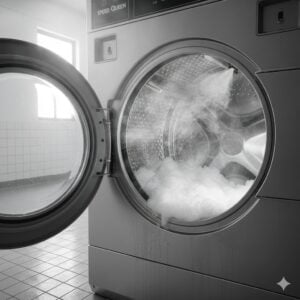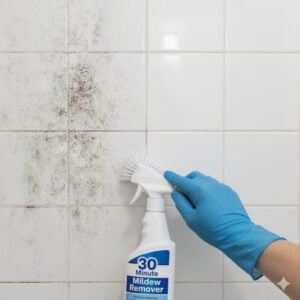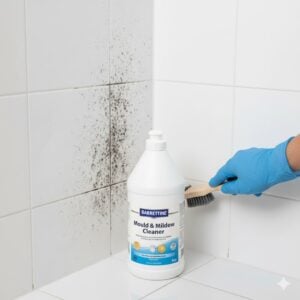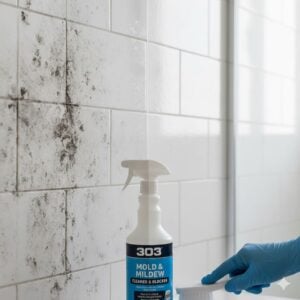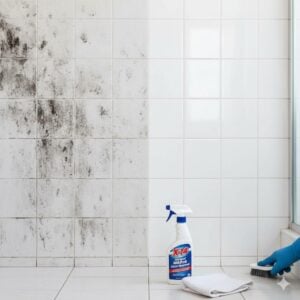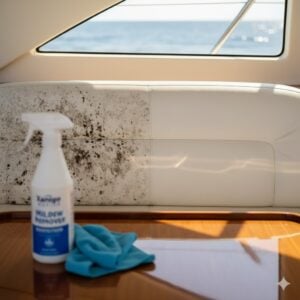If you’ve ever walked into a room and been hit by a damp, musty odor that reminds you of wet socks or a moldy towel, you’re likely dealing with a mildew smell. This smell doesn’t just affect your comfort—it’s often a sign that there’s a hidden moisture issue lurking somewhere in your home. Especially in humid climates like the UAE, mildew smells are common complaints in homes, apartments, and even commercial buildings.
In this article, we explain what causes mildew smell, how to find the source, and most importantly—how you can get rid of it permanently. Whether it’s in your closet, bathroom, AC unit, or bedroom walls, we’ve got practical solutions that work.
Table of Contents
Toggle1. What Is Mildew Smell and Why Does It Occur?
Mildew is a type of mold or fungus that thrives in warm, damp, and poorly ventilated environments. It’s usually lighter in color (white, gray, or yellowish) and flatter than black mold. The smell it gives off is the result of microbial volatile organic compounds (MVOCs)—tiny airborne chemicals released by fungi as they grow and digest organic material.
The signature mildew smell is musty, earthy, and stale. Some describe it as similar to old books, damp clothes left in the washer too long, or a humid basement. It tends to linger even after the visible mildew is cleaned, especially if spores have penetrated porous materials like wood, fabric, or drywall.
In UAE homes, this smell is particularly common in areas with limited airflow—such as behind furniture pushed against walls, under carpets, or inside AC ducts that are not regularly maintained.
2. Where Mildew Smell Commonly Hides in UAE Homes
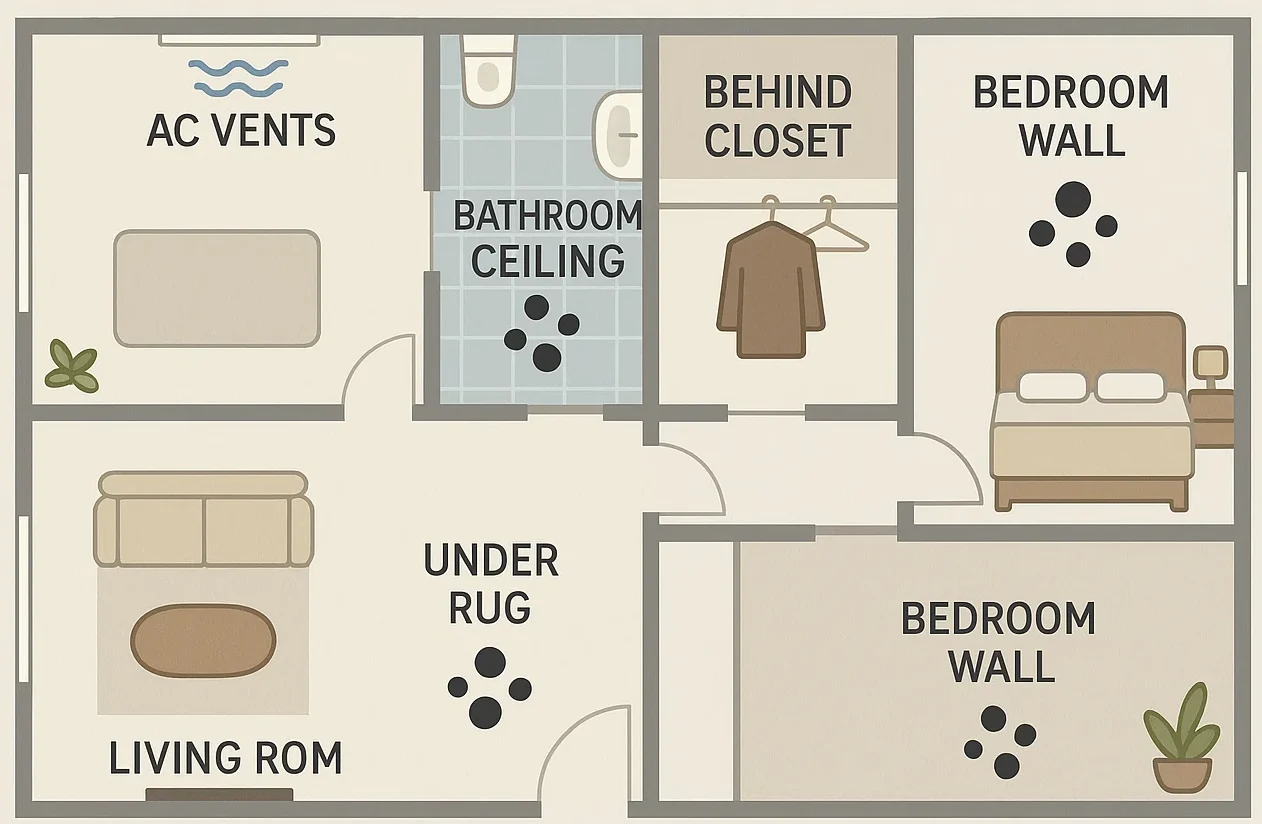
Mildew doesn’t always show itself on the surface. The smell can be your first (and sometimes only) warning sign. Here are the most common places to check if you notice a lingering musty odor in your property:
- Air Conditioning Systems: In humid regions like Dubai or Abu Dhabi, condensation inside AC ducts or on evaporator coils can lead to mold and mildew growth. Dirty filters and clogged drain lines make things worse.
- Bathrooms: Poorly ventilated bathrooms trap moisture in tiles, grout, ceilings, and even under sinks. Shower curtains, bath mats, and towel cabinets can trap mildew too.
- Wardrobes and Closets: Clothes stored in tight, closed wardrobes can absorb and retain mildew smells—especially if they’re slightly damp or the room lacks airflow.
- Under Carpets or Rugs: Spills that aren’t dried fully, or humidity from the floor, can create mildew beneath rugs—especially on tiles or wood flooring.
- Behind Furniture: Sofas, beds, or cabinets placed directly against walls trap air and can encourage mildew if condensation occurs—common in AC-heavy environments.
Sometimes, mildew smell is even stronger in the morning or after returning home, because doors and windows were closed for long hours, letting humidity accumulate.
3. How to Identify the Source of the Mildew Smell
Before tackling the smell, you need to locate the source. Here’s a step-by-step approach that helps you find hidden mildew:
- Sniff-Test Different Rooms: Start with the areas where the smell is strongest. Use your nose near walls, baseboards, under sinks, or inside cabinets.
- Check AC and Vents: Turn off the air conditioning and sniff the vents. If the smell weakens, it might be originating from your AC system.
- Use a Flashlight: Shine it behind furniture, under carpets, or in hidden corners to spot patches of mildew or water damage.
- Inspect Fabrics: Smell curtains, bedding, cushions, or stored clothing. These often trap mildew even when the air smells clean.
- Check for Condensation: Look at walls, windows, or ceilings for signs of moisture beads or discoloration, especially during cooler indoor temperatures.
If you’re still unsure, Bio-On offers air quality testing and surface analysis to detect hidden fungal growth. Just click the contact button on the right-middle of this post to get help.
4. How to Get Rid of Mildew Smell Permanently
Once the source is found, the next step is to clean, dry, and prevent it from returning. Here’s how:
Clean the Mold and Mildew
Use a mix of vinegar and water (50/50) or a commercial anti-fungal cleaner. Scrub the affected area thoroughly. For fabrics, wash them with hot water and baking soda or vinegar. For AC ducts or ceiling mildew, consider professional cleaning to avoid health risks or spreading spores.
Dry the Area Completely
Use fans, open windows, or a dehumidifier to dry the space. In bathrooms or kitchens, make sure ventilation is working. Mildew won’t disappear if moisture lingers.
Absorb the Remaining Odors
Even after cleaning, the musty smell may stay trapped in porous surfaces. Try these:
- Place bowls of baking soda or activated charcoal in the affected room
- Use essential oil diffusers with antifungal oils like tea tree or eucalyptus
- Leave sun-exposed windows open when possible to dry and air the room
Seal and Repaint If Needed
If the mildew smell persists from painted surfaces or drywall, repainting with mold-resistant paint may be needed. But only after the area is properly treated and dried—never paint over live mold.
5. When to Call a Professional
If you’ve cleaned, aired, and deodorized and the mildew smell keeps returning, it’s time to get expert help. Signs that you should call in pros include:
- Visible black or green mold patches
- Smell intensifies after AC or ventilation runs
- Repeated condensation or moisture buildup in specific spots
- Family members experiencing coughing, sinus problems, or skin irritation indoors
We often find that small, ignored mildew smells are actually part of a much bigger hidden mold issue—inside walls, ceilings, or insulation. A professional inspection can prevent long-term damage and health issues.
Bio-On offers certified mold remediation, odor removal, and post-cleanup prevention services across all Emirates. Our team is discreet, fast, and available 24/7 for homes, offices, or rentals.
Conclusion
Mildew smell is more than just an annoying odor—it’s a warning sign that moisture and fungal growth may be affecting your home. In Dubai and other parts of the UAE, heat and AC create the perfect storm for this problem if not managed properly.
You don’t have to live with the musty smell. With the right cleaning steps and a little help from professionals like us, you can breathe fresher air and protect your living space from long-term damage.
If you’re unsure where the smell is coming from or want expert cleanup and prevention, just click the contact button on the right-middle of this post. We’ll take it from there—no pressure, just solutions.








